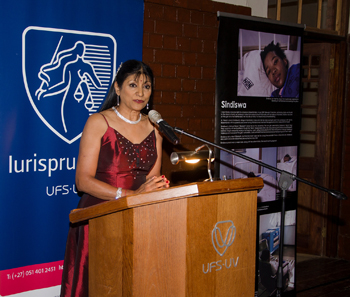Latest News Archive
Please select Category, Year, and then Month to display items
12 October 2020
|
Story Arina Engelbrecht
|
Photo Supplied
 Arina Engelbrecht from Organisational Development and Employee Well-being believes physical activity has a number of benefits for one’s health, including stress relief.
Arina Engelbrecht from Organisational Development and Employee Well-being believes physical activity has a number of benefits for one’s health, including stress relief.
Being physically active plays a big role in preventing the development of mental-health problems and in improving the quality of life of people experiencing mental-health problems.
Treatment for depression
Physical activity can be an alternative treatment for depression. It can be used as a stand-alone treatment or in combination with medication and/or psychological therapy. It promotes all kinds of changes in the brain, including neural growth, reduced inflammation, and new activity patterns are formed that promote feelings of calm and well-being. It releases endorphins – powerful chemicals in the brain that energise your spirit and make you feel good.
Physical activity can be very effective in relieving stress. Research in adults has found that physically active individuals tend to have lower stress levels compared to individuals who are less active. It also leads to improved sleep. When a person sleeps better and feels more rested, overall quality of life improves. They cope better with daily life stressors.
Reduce Alzheimer's risk
Regular physical activity can reduce your risk of developing Alzheimer's disease by up to 50%. It can also slow down further deterioration in those who have already started to develop cognitive problems. It stimulates the brain’s ability to maintain old connections as well as to make new ones.
A study asked people to rate their mood immediately after periods of physical activity (e.g. going for a walk/run, cycling, doing housework) and periods of inactivity (e.g. reading a book or watching television). Researchers found that participants felt more content, more awake, and calmer after being physically active compared to after periods of inactivity.
In conclusion, people who are physically active feel a sense of well-being, feel more energetic throughout the day, sleep better at night, have sharper memories, and feel more relaxed and positive about themselves and their lives.
“Being physically active not only changes your body, it changes your mind,
attitude, and your mood.” – Arina Engelbrecht
Protecting women and children - top on the agenda for women in law
2015-02-24

Judge Soma Naidoo
Photo: Hanno Otto |
The Faculty of Law in collaboration with the International Association of Women Judges (IAWJ) hosted a gala dinner with the theme: ‘Protect a woman, protect a child’ on 14 February 2015 at the UFS Centenary Complex.
In attendance were leading South African women judges and members of the IAWJ’s Justices: Halima Sulduker of the Supreme Court of Appeal, Connie Mocumi of the Free State High Court, and Soma Naidoo of the Free State High Court . The UFS was represented by the Dean of the Faculty of Law, Prof Caroline Nicholson and other senior faculty members. The keynote address was presented by Prof Beatri Kruger.
The title of the keynote speech, ’Killing human trafficking in South Africa: chaos, challenges and celebrations’, was inspired by the extensive research which Prof Kruger has been doing over recent years on human trafficking. “Human trafficking is not just another crime; it is complex, multi-layered and extends over international borders and continents. It is often disguised and has many faces –from trafficking for labour to sexual exploitation; mutilation of body parts, forced marriages, drug couriering; the list is endless. New forms of human trafficking are revealed continuously,” she said.
‘Protect a woman, protect a child’ (read the full story)